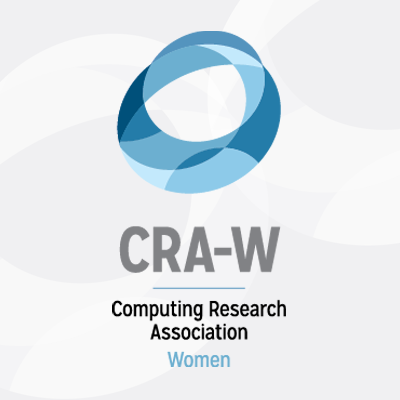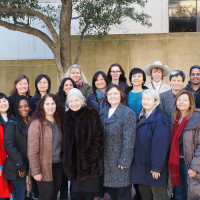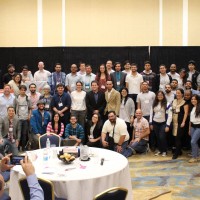Resources for the Engaging Women in Robotics Panel at 2015 NRI PI Meeting
This page contains links to resources relevant to engaging women in robotics. We are also trying build a database of women in robotics. If you have data or resources to contribute, or if you are a women in robotics, please send the information to womenrobotics@gmail.com.
The resources on this page are categorized as follows, with some appearing in more than one category as relevant:
- Organizations
- Resources and Events Related to Women in Robotics
- General Resources
- Male Advocates
- Faculty, Researchers, and Postdocs
- Graduate Students
- Undergraduates
- K-12
Organizations
AAUW: American Association of University Women
AAUW’s mission is to advance equity for women and girls through advocacy, education, philanthropy, and research.
ACM-W: Association for Computing Machinery (ACM) Council on Women in Computing
ACM-W supports, celebrates, and advocates internationally for the full engagement of women in all aspects of the computing field. ACM-W has local chapters, including student chapters, and a list of affiliated events around the world. They sponsor scholarships and awards focused on women in computing.
ASEE WIED: Women in Engineering Division of the ASEE
The objective of the Women in Engineering Division (WIED) of the American Society for Engineering Education is to study, promote and improve the role of women in the professions of engineering and engineering technology through the collection of data, publications, presentations at appropriate meetings, sponsorship of conferences, and similar activities.
CRA-W: Computing Research Association Committee on the Status of Women in Computing Research
CRA-W’s mission is to increase the success and participation of women in computing research and education at all levels. Their programs, people and materials provide mentoring and support for women at every level of the research pipeline: undergraduate students, graduate students, faculty, and industry and government researchers.
CWSEM is a standing committtee in the Policy and Global Affairs division of the National Academies of Sciences, Engineering and Medicine. Its mandate is to coordinate, monitor, and advocate action to increase the participation of women in science, engineering and medicine.
WIE: IEEE Women in Engineering
The mission of IEEE WIE is to facilitate the global recruitment and retention of women in technical disciplines. IEEE WIE envisions a vibrant community of IEEE women and men collectively using their diverse talents to innovate for the benefit of humanity. The WIE site has links to WIE specific newletters and magazines, as well as three awards specifically for females. Further, there is a directory that may help people network and seek mentoring.
NCWIT: National Center for Women in Information Technology
NCWIT works to correct the imbalance of gender diversity in technology and computing because gender diversity positively correlates with a larger workforce, better innovation, and increased business performance. NCWIT has a number of valuable resources, such as on male advocates, REU-in-a-Box, and tips for conducting inclusive faculty searches. The NCWIT Academic Alliance and K-12 Alliance have programs focused on engaging women in IT.
SWE: Society of Women Engineers
SWE’s mission is to stimulate women to achieve full potential in careers as engineers and leaders, expand the image of the engineering profession as a postive force in improving the quality of live, and demonstrate the value of diversity.
WEPAN: Women in Engineering ProActive Network
WEPAN is a non-profit educational organization dedicated to advancing cultures of inclusion and diversity in engineering higher education and workplaces.
Resources and Events Related to Women in Robotics
2015 ICRA: IEEE International Conference on Robotics and Automation
ICRA 2015 had an all female organizing committee. Lynne Parker (General Chair) and Nancy Amato (Program Chair) wrote an article describing highlights of the conference that was published in the IEEE Robotics and Automation Magazine. The IEEE Institute also featured an article – An All-women Organizing Committee Brings Diversity to Robotics Conference.
Innovations in Robotics Panel at the 2015 IEEE WIE International Leadership Conference
The IEEE Robotics and Automation organized a panel on leading innovation in robotics and automation at the 2015 IEEE Women in Engineering (WIE) International Leadership Conference. Allison Okamura, Lynne Parker, and Jing Xiao were the speakers and they spoke about their experience, technical and scientific skills, and other aspects that can make a difference in innovation and leadership.
Workshops on Women in Robotics
Workshops on Women in Robotics have been held at RSS 2014 and RSS 2015.
Robohub Women in Robotics Listing
Starting in 2013, Robohub has been publishing a list of `25 Women in Robotics You Need to Know About’ that showcases women in robotics: 25 women in robotics you need to know about (2015), 25 women in robotics you need to know about (2014), 25 women in robotics you need to know about (2013).
General Resources
AAUW: Why So Few? Women in Science, Technology, Engineering and Mathematics
This 2010 report by the AAUW examines the question as to why there are so few women scientists and engineers. It presents eight key research findings that point to environmental and social barriers — including stereotypes, gender bias, and the climate of science and engineering departments in colleges and universities — that continue to block women’s progress in STEM.
NCWIT: Sterotype Threat Resources
Stereotype threat is a situation in which individuals confirm to stereotypes about their social group, and it can be triggered by reminding them they are in that group. As an example, female undergraduate engineering majors at Stanford were found to perform worse on Calculus exams if they were reminded they were female before taking the exam — whereas males were found to perform better if they were reminded they were male. NCWIT has several resources related to stereotype threat: a slide deck Stereotypes and Stereotype Threat Affect Computing Students and a companion talking point card Talk with Faculty Colleagues About Stereotype Threat.
NCWIT: Unconscious Bias Resources
Unconscious bias, also known as implicit bias, refers to attitudes that affect our perceptions, actions and decisions without our knowledge. As an example, in one well known study, resumes that differed only in the gender of the name were evaluated by 238 professors, themselves half male and half female, and they were found to rate the “male”applicant higher than the “female” applicant. NCWIT provides pointers to resources that explain the problem and how reducing unconscious bias can increase women’s success in IT. The NCWIT video Unconscious Bias and Why is Matters describes the concept of unconscious bias and provides suggestions for addressing it. The NCWIT Checklist for Reducing Unconscious Bias in Job Descriptions/Advertisements helps analyze ads for subtle biases in language, in criteria, and in how you describe your workplace. The NCWIT Tips for Writing Better Job Ads provide “before and after” examples of ads with balanced language and other guidelines for writing unbiased job descriptions.
Male Advocates
NCWIT Report Male Advocates and Allies: Promoting Gender Diversity in Technology Workplaces
The report Male Advocates and Allies: Promoting Gender Diversity in Technology Workplaces, sponsored by NCWIT’s Workforce Alliance, provides an inside look into how men think about and advocate for diversity in the technical workplace. Drawing from interviews with 47 men in technical companies and departments, this study: 1) Identifies the factors that motivate or hinder men in advocating for gender diversity, 2) explores what diversity efforts men have experienced as successful or unsuccessful, and 3) identifies specific strategies to increase men’s participation in advocacy.
NCWIT Top 10 Ways to be a Male Advocate for Technical Women
The NCWIT Top 10 Ways to Be a Male Advocate for Technical Women resource provides examples of how male advocates say they support technical women and promote diversity.
NCWIT Tips: 8 Ways to Identify Male Advocates and NCWIT Tips: 8 Ways to Increase Male Advocacy
The NCWIT Tips: 8 Ways to Identify Male Advocates resource can be used to help identify likely male advocates and to spark discussion. Once potential male advocates have been identified, the NCWIT Tips: 8 Ways to Increase Male Advocacy resource can be used to increase their advocacy.
ASEE WIED Advocacy Tips to Promote Gender Equity
The ASEE Women in Engineering Education Division promotes Advocacy Tips to promote gender equity developed the North Dakota State University Advocates and Allies program, initiated by an NSF ADVANCE grant. They welcome contributions to their list.
Faculty, Researchers, and Postdocs
CRA-W Early Career Mentoring Workshops (Early CMW)
The Early CMW workshop brings researchers and educators in the early stages of their careers together with women that are established in their fields for career mentoring. Topics include: how to build a great research program, how to prepare for promotion and success, and how to balance work and life.
CRA-W Mid-Career Mentoring Workshops (Mid CMW)
The Mid CMW workshop brings women in the middle stages of a research or teaching career together with senior women for career mentoring. Topics include: how to be an effective leader, how to prepare for promotion to a more senior position, and how to balance work and life.
CRA-W Mentoring Tracks at Grace Hopper
In these sessions at the annual Grace Hopper Celebration of Women in Computing Conference, successful computer scientists provide mentoring and career guidance to undergraduates, graduate students, faculty and researchers in industry and government labs.
They Call Me Doctor Berry (NYT Op-Ed, Nov 2, 2014)
This letter by Prof. Carlotta Berry explains first hand some of the challenges faced by women and people of color in the academy. It appeared in the NYT Op-Ed section on Nov. 2, 2014.
Changing the Narrative (SWE Magazine, Winter 2015)
This article discusses attracting and retaining African American women in academic engineering. It appeared in the Winter 2015 SWE Magazine.
Graduate Students
The Grad Cohort Workshop brings together women graduate students in their first three years of graduate with successful senior women researchers from academia, industry and government laboratories for discussions on how to succeed in graduate school and in a research career.
CRA-W/CDC Discipline Specific Workshops (DSW)
The DSW workshops provide career mentoring and networking opportunities in the context of a specific research area, including coverage of technical topics.
CRA-W Mentoring Tracks at Grace Hopper
In these sessions at Grace Hopper, successful computer scientists provide mentoring and career guidance to undergraduates, graduate students, faculty and researchers in industry and government labs.
CRA-W/CDC Mentoring Tracks at Tapia
In these sessions at Tapia, successful computer scientists provide mentoring and career guidance to undergraduates and graduate students.
Undergraduates
CRA-W/CDC Collaborative Research Experiences for Undergraduates (CREU)
The CREU program is an undergraduate research program that provides research stipends to teams of students from underrepresented groups working on research projects under the guidance of a mentor at their home institutions.
CRA-W/ CDC Distributed Research Experiences for Undergraduates (DREU)
The DREU program matches promising undergraduate women and underrepresented groups with a faculty mentor for a summer research experience at the faculty member’s home institution.
CRA-W Virtual Undergraduate Town Hall Series
The Virtual Undergraduate Town Hall Series (Webinars), provide a virtual mentoring event for undergraduate majors in CSE interested in research and graduate school. Students have the opportunity to ask distinguished computer scientists any questions they might have about research as well as graduate school.
CRA-W/CDC Distinguished Lecture Series (DLS)
The DLS program provides funding to host prominent academic and industrial researchers that can serve as role models and mentors for young women and minorities. The visitors deliver technical talks and participate in undergraduate and graduate recruiting and mentoring events.
CRA-W Mentoring Tracks at Grace Hopper
In these sessions at Grace Hopper, successful computer scientists provide mentoring and career guidance to undergraduates, graduate students, faculty and researchers in industry and government labs.
CRA-W/CDC Mentoring Tracks at Tapia
In these sessions at Tapia, successful computer scientists provide mentoring and career guidance to undergraduates and graduate students.
K-12
NCWIT Aspirations in Computing
Aspirations in Computing is a talent development pipeline initiative of the National Center for Women & IT (NCWIT) designed to increase women’s meaningful participation in computing careers by providing encouragement, visibility, community, leadership opportunities, scholarships, and internships to high potential technically inclined young women.







